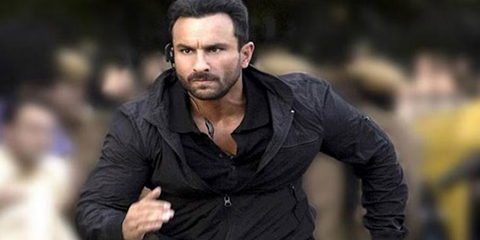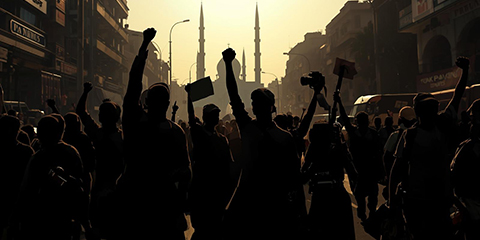Geo News's insensitivity: Songs and dance before announcing tragic Bollywood news
JournalismPakistan.com | Published last year | JP Staff Report
Join our WhatsApp channel
ISLAMABAD—Geo News Television has come under fire for its insensitive and tone-deaf coverage of the tragic news involving Bollywood star Saif Ali Khan. The actor was reportedly stabbed six times at his Mumbai residence by a burglar, an incident that shocked fans and the entertainment industry worldwide. However, instead of treating the grave situation with the seriousness it deserved, Geo News aired a series of Bollywood song clips featuring Saif Ali Khan dancing and singing, before announcing the harrowing details of the attack.
This inappropriate choice of presentation was not only tasteless but also demonstrated a lack of journalistic ethics. In situations involving violence or tragedy, the role of the media is to report with empathy and respect, especially when the news involves public figures whose lives are under constant scrutiny.
Insensitive Journalism: A Growing Concern
The broadcast included at least five Bollywood clips showcasing Saif Ali Khan in iconic dance numbers alongside different actresses. The sequence was lively, colorful, and completely out of place given the grim context. After the montage ended, the presenter finally announced that Saif Ali Khan had been stabbed and that his wife, Kareena Kapoor, and their young son were present at the time of the attack.
This approach was not only inappropriate but bordered on sensationalism. By framing the tragic news with such upbeat visuals, Geo News trivialized a potentially life-threatening situation. The broadcast conveyed a lack of seriousness, turning what should have been a sobering report into a spectacle of poor taste.
Why This Matters
The insensitivity of this coverage reflects a deeper issue within the media industry—the prioritization of sensationalism over responsible journalism. Tragedies and personal crises should never be used as entertainment fodder to grab viewers’ attention. When the media fails to report with respect and integrity, it diminishes public trust and fuels accusations of commercialized journalism.
In this case, Geo News missed an opportunity to set a standard for ethical reporting. Instead, their tone-deaf broadcast highlighted the widening gap between responsible news coverage and sensational storytelling. The channel's failure to align its presentation with the gravity of the incident has left many questioning whether media organizations are losing touch with their moral obligations to viewers and the subjects of their stories.
Viewer Backlash
The response on social media was swift and scathing. Many viewers expressed their disappointment, accusing Geo News of trivializing a serious incident and disrespecting the actor and his family.
“Poor Saif Ali Khan has been rushed to the hospital with injuries. A knife was lodged in his collarbone. He was in critical condition, but looking at the style of Geo's headline, it seemed as if they were delivering some happy news,” Sabi Mehmood Hashmi posted on X (formerly Twitter).
Media Ethics in the Spotlight
This incident reignites the debate over ethics in media coverage. Should ratings and viewership dictate how news is presented? Is it acceptable to inject entertainment into reports about serious, even life-threatening situations?
The answer lies in the principle that news, especially tragic news, must be delivered with the utmost respect for those involved. The media’s role is to inform, not to sensationalize. Coverage should focus on the facts, the impact, and, where appropriate, the broader implications, rather than prioritizing visuals or narratives that seek to entertain.
Geo News’s handling of Saif Ali Khan’s stabbing incident is a stark reminder of the ethical challenges facing media organizations today. As the public grows increasingly critical of sensationalism in news, it is imperative for channels to reassess their priorities. Trust, integrity, and sensitivity must take precedence over ratings-driven content.
The tragedy involving Saif Ali Khan deserved empathy, not entertainment. Media outlets must recognize that in the race for viewership, crossing ethical boundaries can come at the cost of their credibility.

























